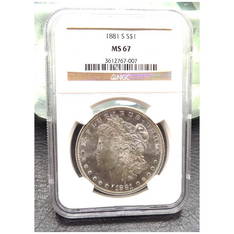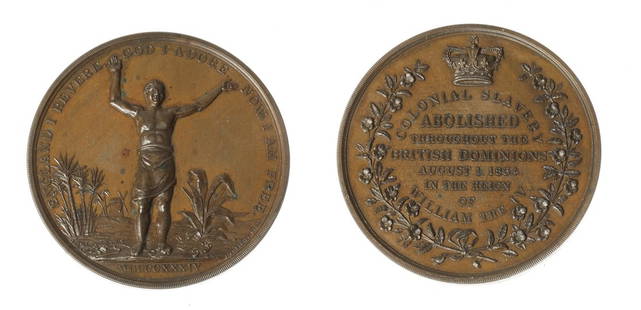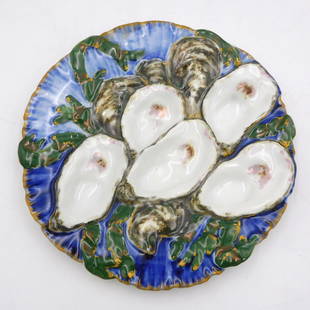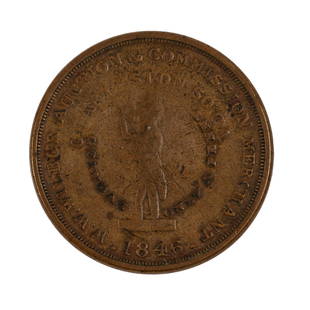
French bronze medal, 1820 Naissance du Duc de Bordeaux
Similar Sale History
View More Items in Historical MemorabiliaRelated Historical Memorabilia
More Items in Historical Memorabilia
View MoreRecommended Collectibles
View More







Item Details
Description
French bronze medal, 1820 Naissance du Duc de Bordeaux - Chateaubriand - 1820Naissance du Duc de Bordeaux – 1820Medal issued by public subscription (on the initiative of Chateaubriand) commemorating the birth of the duc de Bordeaux, posthumous son of the Duke of Berry and future Henri V (king of France for only seven days: 2-9 August 1830).Side 1: DIEU NOUS LA DONNE. The Duchess of Berry holding her newborn son, with her late husband's bust in the right background.In ex.: NOS COEURS ET NOS BRAS SONT A LUI.Side 2: 29 SEPT. 1820. St. Michael defeating the devil.Below: GAYRARD F.Weight: 31.48g;Diameter: 38 mm;Henri of Artois, Count of Chambord (Henri Charles Ferdinand Marie Dieudonné d'Artois, duc de Bordeaux, comte de Chambord; 29 September 1820 – 24 August 1883) was disputedly King of France from 2 to 9 August 1830 as Henry V, although he was never officially proclaimed as such. Afterwards, he was the Legitimist pretender to the throne of France from 1844 to 1883.Henri was the posthumous son of Charles Ferdinand, Duke of Berry, younger son of Charles X of France, by his wife, Princess Carolina of Naples and Sicily, daughter of King Francis I of the Two Sicilies. As the grandson of the king, Henri was a Petit-Fils de France.He was born on 29 September 1820, in the Pavillon de Marsan, part of the Tuileries Palace which still survives in the Louvre Palace in Paris. Henri's father, the duc de Berry, had been assassinated seven months before his birth. At the actual moment of Henri's birth, no member of the French court was present in the room; this enabled the supporters of Louis Philippe, duc d'Orléans, to later claim that Henri was not in fact a French prince.[citation needed]At birth, Henri was given the title of duc de Bordeaux. Because of his posthumous birth when the senior line of the Bourbon dynasty appeared about to become extinct, he was given the name Dieudonné ("God-given", in English). Royalists called him "the miracle child".On 2 August 1830, in response to the July Revolution, Henri's grandfather, Charles X, abdicated, and twenty minutes later Charles' elder son Louis Antoine, duc d'Angoulême, also abdicated in favor of the young duc de Bordeaux. Louis Philippe of Orléans, as Lieutenant général du royaume, was supposed to proclaim Henri as Henri V, King of France and of Navarre, but deliberately did not do so. As a consequence, after seven days, during which legitimist monarchists considered that Henri had been the rightful monarch of France, the National Assembly decreed that the throne should pass to Louis Philippe, who was proclaimed King of the French on 9 August.[2]Henri and his family left France and went into exile on 16 August 1830. While some French monarchists recognized him as their sovereign, others disputed the validity of the abdications of his grandfather and of his uncle[citation needed]. Still others recognized the July Monarchy of Louis Philippe. With the death of his grandfather in 1836, and of his uncle in 1844, Henri became the genealogically senior claimant to the French throne. His supporters were called Legitimists to distinguish them from the Orléanists, the supporters of the family of Louis Philippe.Henri, who preferred the "courtesy" title of comte de Chambord (from the château de Chambord, which had been presented to him by the nation, and which was the only significant piece of personal property he was allowed to retain ownership of upon his exile), continued to make his claim throughout the July Monarchy of Louis Philippe, the Second Republic, and the Second Empire of Napoléon III. In November 1846, the comte de Chambord married his second cousin Archduchess Maria Theresa of Austria-Este, daughter of Duke Francis IV of Modena and Princess Maria Beatrice of Savoy. Her maternal grandparents were Victor Emmanuel I of Sardinia and Maria Theresa of Austria-Este; the couple had no children.
Buyer's Premium
- 0%
French bronze medal, 1820 Naissance du Duc de Bordeaux
Estimate $300 - $600
2 bidders are watching this item.
Shipping & Pickup Options
Item located in Tampa, FL, usSee Policy for Shipping
Payment

TOP




























![[WOMEN’S SUFFRAGE]. Medal awarded to Boy Scout Fred C. Reed...: [WOMEN’S SUFFRAGE]. Medal awarded to Boy Scout Fred C. Reed for assistance rendered during 1913 Woman Suffrage Parade. Original circular bronze medal with bronze suspension bar depicting a pair](https://p1.liveauctioneers.com/928/265343/138523219_1_x.jpg?height=310&quality=70&version=1666130009)











































![George Washington Signed Discharge: Partly printed discharge document signed by George Washington, as Commander in Chief of the Armies of the United States. Newburgh, [New York], 4 January 1783. 1 page, ## x ## in. Undersigned by Washin](https://p1.liveauctioneers.com/7226/322253/173251475_1_x.jpg?height=310&quality=70&version=1710004847)
![[Ambrotype] Texas Confederate Soldier: Sixth plate ambrotype. Full leatherette case. Portrait of a possible Texas Confederate soldier. A silver star device was used to pin up the brim of his light-toned headgear, a look often seen in image](https://p1.liveauctioneers.com/7226/322253/173251509_1_x.jpg?height=310&quality=70&version=1710004847)



